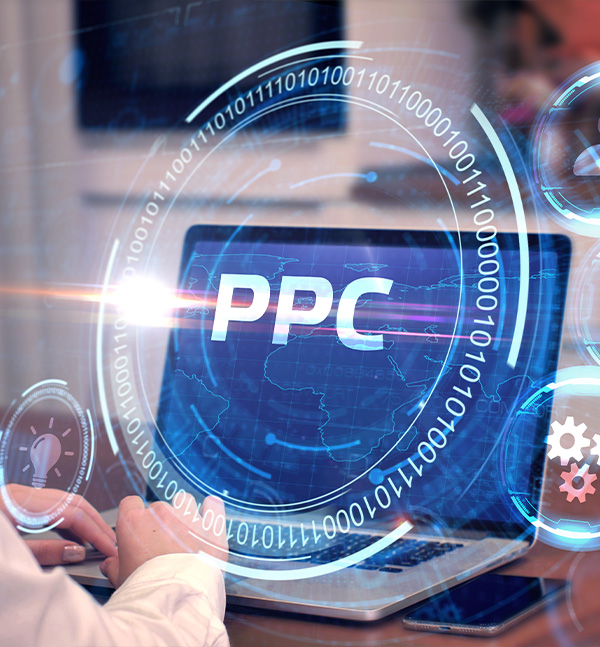PPC

The Ultimate Guide to Paid Advertising for Healthcare Practices

The Ultimate Google Ads PPC Kit
PPC can bring people to your site who are ready to learn more.
Schedule Free DemoThe most successful practices utilize both search engine optimization (SEO) and paid ads to advertise. Whether you are a brand-new practice with no web authority or are an established practice that is looking for more exposure, paid ads can bring your more traffic and leads. Read on to learn more about paid advertising and why you should utilize its many benefits.
What is Paid Advertising?
Paid advertising is exactly what you would think it is: any form of advertising that you must pay for. With this form of advertising, marketers pay for ad space, with the price of that space often determined through a bidding process. There are a number of different categories of paid advertising, including pay-per-click (PPC), pay-per-impression (PPI), and display ads. In this guide, we will focus on PPC ads.
About PPC Advertising
PPC advertising allows you to pay a fee to have your website on the search engine results page (SERP) when someone searches certain phrases or keywords in a search engine like Google. The SERP displays the PPC ads to give visitors easy access to your landing page or site. The fee that you pay will be based on whether people click on your ad. PPC ads are the results that you see before the organic search results and will have the words “Ad” before them.
PPC Definitions and Terms You Should Know
For a good understanding of paid advertising, it is helpful to become familiar with a few terms. We’ve put together a list of the most-used terms in paid advertising to help you better understand the process.
Search Engine Marketing (SEM): The goal of all types of digital advertising is to rank for a target keyword, which can be achieved in several ways. Search Engine Marketing (SEM) refers to any digital marketing done on a search engine like Google. It is an umbrella term that includes both paid advertising and search engine optimization (ranking organically for keywords). It is worth noting that not all PPC occurs on search engines alone, as social media has PPC ads as well.
Cost-Per-Click (CPC): Cost-per-click is where an advertiser (you) pays a cost to a publisher for every click on your ad. The higher your bid is, the better ad placement you will have. You set your CPC at the highest price you are willing to pay per click on your ad, but the actual amount of money you pay will be determined by this formula: (Competitor’s Ad Rank/Your Quality Score) +0.01= Actual CPC.
Cost Per Mille (CPM): The CPM is the cost per one thousand impressions. It is typically used for paid social and display ads.
Campaign: Determining your ad campaign is the first step in setting up your PPC ads. A campaign can be thought of as a key message that you would like to share with your ads.
Ad Group: An ad group contains one or more ads that share similar targets or goals. Each campaign is made up of one or more ad groups. You can use these groupings to organize your ads by common themes.
Keywords: Each ad in your ad group will target a set of related keywords that will tell search engines which terms you want your ad to be displayed alongside in SERPs. Once you discover which keywords perform best, you can set a micro CPC, particularly for keywords within your ads.
Landing Page: A landing page is where users will be directed once they click on your PPC ad. These pages may be a website, your homepage, or somewhere else, but it must follow landing page best practices to maximize conversions.
The Best PPC Platforms
There are many online spaces that can be used for advertising, but the best way to determine which one is right for you is to take a look at your potential return on investment (ROI) on each platform. The most commonly used advertising platforms are popular because they are easy to use and highly trafficked. However, if you have a smaller budget, you may consider a lesser-known alternative to the most popular options. Some important things to consider when choosing a platform are the availability of keyword terms, your advertising budget, and where your target audience spends their time.
Some of the top PPC platforms include Google Ads, Bing Ads, Facebook Ads, AdRoll, and RevContent.
PPC Benefits
You probably have a better idea of what PPC ads are now. However, do you know exactly how they can be beneficial for your practice? When utilized correctly, PPC ads offer many benefits, including the following.
Cost-Effective: PPC ad campaigns allow you to have total control over how much money you want to spend. Because you only pay when visitors click on the link leading to your landing page, which also leads to conversions, you can easily get your money’s worth.
Produce Quick Results: While organic ranking is great, it can take a long time to get onto the first page on SERPs. Small businesses and startups often do not have this much time to wait for the effect of organic ranking to kick in. PPC ads can help you shoot to the top of the SERP quickly after launching your campaign.
Allows easy control and testing of PPC Ads: With PPC ads, it is easy to control the keywords you are focusing on, budget, and ad placement. You can also run tests with different ads to determine the one that obtains the highest ROI.
Enables you to Target your Ideal Customers: These ads also allow you to immediately target an audience that is ready to buy your services and products. You can bid on keywords that your target audience would search for online. PPC ads also allow you to create retargeting campaigns to focus on visitors who didn’t purchase after looking at your site or landing page.
Help you to Rank Even with Low Domain Ratings: Keywords have become more competitive over time, which can make it difficult for businesses with low domain authority to get into the top rankings on a search engine or be seen by their target audience on social media. With PPC, you can quickly rank for keywords your audience is searching for, despite your domain rankings.
PPC Management
One thing to understand about paid advertising is that you need to manage and constantly monitor it to ensure you are maintaining optimal results. Management, tracking, and analysis are very important to a PPC campaign because they provide you with the information you need to create a more effective campaign, and therefore, bring in more leads.
If you want to benefit from PPC ads but just don’t have the time to constantly monitor your campaigns, our experts at DLM can help. We offer paid advertising management services so you can reap all of the benefits of conversions without doing the dirty work.
Give Us a Call
If you are ready to gain conversions through PPC ads, give Digital Limelight Media a call today at 616-222-3735 or contact us online. We would love to talk with you regarding your advertising goals and determine the paid advertising strategy that is right for you.





